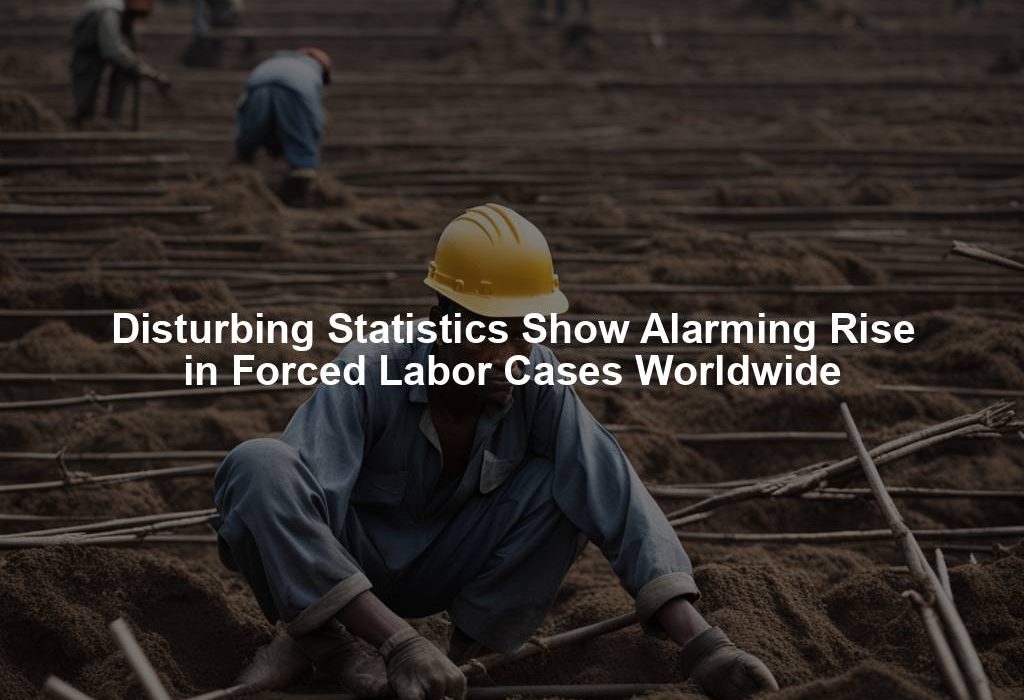Forced labor casts a dark shadow over societies worldwide, resembling a contemporary form of slavery that ensnares countless individuals annually. Whether it manifests in sweatshops within developing nations or as domestic servitude in affluent households, its insidious presence permeates various facets of life. Shockingly, the International Labour Organization (ILO) estimates that a staggering 25 million people currently endure forced labor globally. Recent data underscores a troubling surge in forced labor incidents globally, underscoring the critical need for decisive action to combat this pervasive menace.
A primary factor propelling the surge in forced labor occurrences is the escalating demand for inexpensive labor across sectors like agriculture, manufacturing, construction, and domestic services. As corporations chase heightened profits and trim expenses, they frequently turn a blind eye to the exploitation festering within their supply chains. Consequently, vulnerable individuals find themselves coerced into toiling endlessly for meager or nonexistent compensation, often enduring harrowing conditions.
The advent of the COVID-19 pandemic has further exacerbated the crisis of forced labor, thrusting many into dire financial straits and coercing them into desperate measures for survival. With widespread job losses, economic instability, and limited access to social services, individuals have become more susceptible to exploitative schemes orchestrated by traffickers and unscrupulous employers. Notably, the ILO projects a potential spike in forced labor victims due to the pandemic, reinforcing the pressing need for heightened vigilance and proactive intervention.
Moreover, forced labor frequently intersects with other forms of exploitation, including human trafficking and sexual abuse. Victims are often enticed with promises of a brighter future or employment prospects, only to find themselves ensnared in labor coercion against their will. Many endure physical and psychological torment, rendering it arduous for them to seek assistance or break free from their captors.
The repercussions of forced labor extend beyond the direct victims, rippling into communities, economies, and global supply chains. It engenders diminished productivity, reduced wages, and escalated health and safety hazards for laborers. Furthermore, it can foster corruption, organized crime, and instability in regions grappling with its prevalence, perpetuating cycles of poverty and exploitation.
In light of the distressing surge in global forced labor cases, collaborative efforts among governments, international entities, civil society organizations, and businesses are underway to tackle the root causes of this pervasive issue and shield vulnerable individuals from exploitation. Endeavors like the ILO’s Forced Labour Protocol and the United Nations’ Sustainable Development Goals strive to eliminate forced labor and champion inclusive work environments for all. Nonetheless, a more concerted approach is imperative to ensure perpetrators are held answerable, victims are supported, and a culture of zero tolerance towards forced labor in all its guises is entrenched.
In essence, the escalating prevalence of forced labor worldwide serves as a disquieting wake-up call that necessitates immediate attention and resolute action. By amplifying awareness, fortifying legislative frameworks, and enforcing accountability measures, we can collaboratively dismantle the specter of forced labor and forge a fairer, more just world for every individual.
Sources:
1. International Labour Organization. (2021). Global Estimates of Modern Slavery: Forced Labour and Forced Marriage. Retrieved from https://www.ilo.org/global/topics/forced-labour/lang–en/index.html
2. United Nations Office on Drugs and Crime. (2020). Global Report on Trafficking in Persons. Retrieved from https://www.unodc.org/documents/data-and-analysis/glotip/GLOTIP_2020_20web_
3. United Nations Sustainable Development Goals. (n.d.). Goal 8: Decent Work and Economic Growth. Retrieved from https://sdgs.un.org/goals/goal8
4. Human Rights Watch. (2021). World Report 2021: Events of 2020. Retrieved from https://www.hrw.org/world-report/2021
5. Global Slavery Index. (2021). Global Findings on Modern Slavery. Retrieved from https://www.globalslaveryindex.org/




